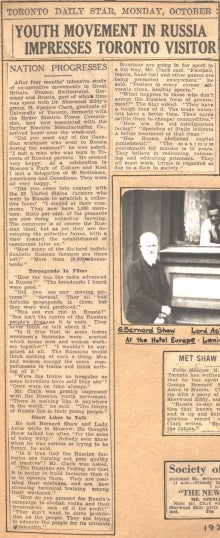Dana Porter Library, first floor
University of Waterloo Library
Waterloo, Ontario N2L 3G1
519-888-4567 x42619 or x42445
 YOUTH MOVEMENT IN RUSSIA IMPRESSES TORONTO VISITOR
YOUTH MOVEMENT IN RUSSIA IMPRESSES TORONTO VISITOR
October 26, 1931
NATION PROGRESSES
After four months’ intensive study of co-operative movements in Great Britain, France, Switzerland, Germany and Russia, part of which time was spent with Dr. Sherwood Eddy’s group, H. Spencer Clark, graduate of University of Toronto, formerly with the Hydro Electric Power Commission, and now associated with the Taylor Electric Manufacturing Co., arrived home over the week-end.
"Did you meet any of the Canadian workmen who went to Russia during the summer?" he was asked. "I met a man who was born in Toronto of Russian parents. He seemed very happy. At a celebration in Moscow's Park of Culture and Rest I met a delegation of 60 Britishers, Americans and Canadians. They were all very happy. "
"Did you come into contact with the 52 United States farmers who went to Russia to establish a collective farm? "I stayed at their commune. They now have 1,600 members. Sixty per cent. of the peasants are now doing collective farming. The commune is of course the Russian ideal, but as yet they are developing the collective farms, with a view toward the establishment of communes later on."
"How many of the die-hard individualistic Russian farmers are there left?" "More than 10,000 households."
Propaganda In Films
"How far has the radio advanced in Russia?" "The broadcasts I heard were good."
"Did you see any moving pictures?" "Several. They all had definite propaganda in them, but they were well produced."
"Has sex run riot in Russia?" "Sex isn't the centre of the Russian people's lives as it is ours. They never think or talk about it."
"Is it true that in some towns workmen's barracks were erected which house men and women workers together"? "I wouldn't be surprised at all. The Russians would think nothing of such a thing. Men and women occupy the same compartments in trains and think nothing of it."
"Were the trains as Irregular as some travellers have said they are"? "Ours were on time always."
Mr. Clark was greatly impressed with the Russian youth movement. "There is nothing like it anywhere in the world," he said. "The future of Russia lies in their young people."
Shaw Likes to Talk
He met Bernard Shaw and Lady Astor while in Moscow. He thought Shaw talked too often "for the sake of being witty." Nobody ever knew when he was serious or trying to be funny, he said.
"Is it true that the Russian factories are turning out poor quality of tractors"? Mr. Clark was asked.
"The Russians are finding out that it is easier to build factories than it is to operate them. They are realizing their mistakes, and are now stressing technical training among their workmen."
"How do you account for Russia's campaign to abolish vodka and their tremendous sale of it for profit?' "They don't want to force prohibition on the people. They are trying to educate the people for its ultimate elimination."
Russians are going in for sport in a big way, Mr. Clark said. “Football, tennis, hand-ball and other games are being promoted everywhere,” he said. “Posters in every corner advocate clean, healthy sports.”
“What happens to those who don’t accept the Russian form of government?” The Star asked. “They have a tough time of it. The trade unionists have a better time. Their cards entitle them to cheaper commodities.”
“How are the old intelligentsia faring?” “Speeches of Stalin indicate a better treatment of that class.”
“Has Russia abolished capital punishment?” “The maximum punishment for murder is 10 years. They believe in redeeming, reforming and educating prisoners. They all must work. Crime is regarded as due to a flaw in society.”




